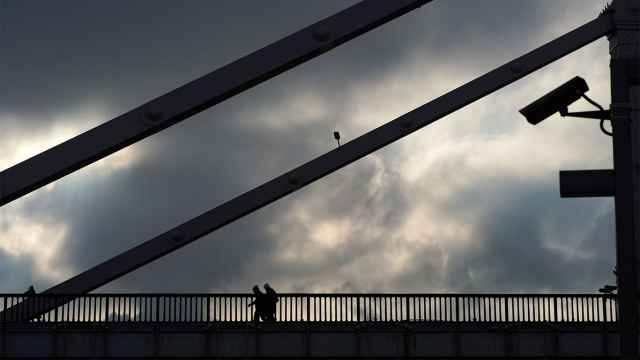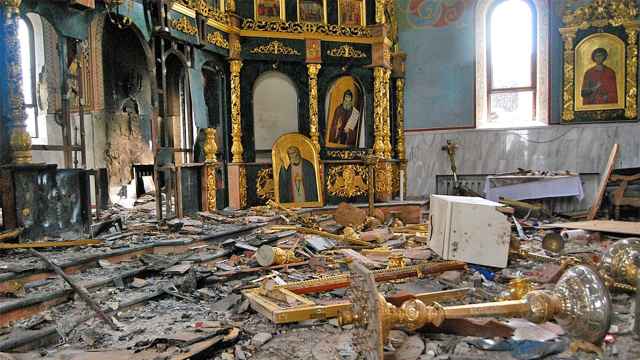As I descended the steps of the plane that had landed in the southern resort town of Sochi, I saw an FSB officer standing in front of me. His face was covered with a balaclava and there was an automatic rifle slung over his shoulder.
My pulse quickened and I regretted returning home after a year of living abroad. “He's waiting for me,” was my first thought.
He looked menacing. Guys like that kick down the door of your home, throw you face down on the floor and take you away to an unknown destination, only for the news to run a report about the security services catching another spy.
Unexpectedly, he stepped back, waited for everyone to disembark and then got on the plane himself. “Maybe he's looking for me on board,” I thought.
But no. Apparently, it was standard procedure. They probably inspect arriving planes for bombs, drugs or something else.
It took me several months to assess the extent of my paranoia. And I'm not the only one.
Once, I was sitting in a cafе with a colleague who had temporarily returned to Russia. She kept looking around and glancing behind me.
Finally, she leaned over to me and said, “There's a guy sitting there. Behind you, with his back to us, behind the bar.”
She switched to a whisper: "I think he was on the bus with me.” We tried to dismiss the idea that she was being surveilled, but we quickly left the cafе just in case. That's how you have to live as a journalist in Russia today.
Like most of my colleagues who emigrated, I thought I wouldn't be able to return to Russia until the regime changed. But my first trip home was followed by a second, then a third. Gradually, my fear began to fade and I started writing reports from Russia again.
During one of those trips, I decided to stay. I've now been here for more than eight months.
Right now, I'm writing from my favorite coffee shop in my hometown. My old friend, the barista, looks at my laptop and asks, “Aren't you afraid the FSB will arrest you?”
Of course, I'm a little afraid. Especially when she asks me that. But I haven't been paranoid for a long time. I'm not the only one in Russia. There are more of us than you might think. Don't assume that the all-seeing eye of the FSB is monitoring every journalist who strays from the official propaganda narrative when reporting on events in Russia.
Naturally, I have to work very carefully. For example, I can't just walk up to strangers in the street and ask them to be interviewed. The police might find that strange. I could be detained. And if they find out that I write for The Moscow Times or any other banned media, I could face a substantial fine or even a prison sentence.
So, I find people to interview through friends, friends of friends and even friends of friends of friends. I communicate with them using secure messaging apps.
And I can't sign my name to the articles. This is a source of pain for many Russian journalists. But it's better than losing contact with the country.
If you only consume Russian media outlets based in exile, you might get the impression that what is left in Russia is only scorched earth. The economy is on the verge of collapse. People are arrested on the streets every day for the slightest criticism of the authorities. Everyone marches in lockstep, wearing military uniforms emblazoned with a “Z” sign.
This misleads many emigrants, making them afraid to go home. A friend of mine, who is not a journalist, hadn't been to Russia for two years because he was afraid he would be arrested for treason because his ex-girlfriend was a British girl who worked at a government think tank.
The truth is that repression in Russia is still very selective and limited. Even if you're against the war, it's much more likely that you'll be hit by a car or killed by a falling brick than be repressed. But you don't get paranoid about bricks every time you go outside, do you?
Yes, if you're a journalist, the risk is higher, but that's no reason to become paranoid. I know colleagues who have never left Russia. They have been writing about the situation here, including the social consequences of the war, for three and a half years.
There are many subtle nuances that are unlikely to be seen without being immersed in the local context.
Among the everyday stories of repression, sometimes you come across brilliant stories that stand out. Over the last few months, I've met queer people who have found common ground with Z-patriots through unusual situations. I have spoken to hippie hermits who have gone to live in remote forests, far from society and the state. I have visited communes in Moscow and St. Petersburg where leftists, queer people and artists live and stage guerrilla art actions against the state’s arbitrariness.
Often, my fellow passengers on trains were war veterans. I also encountered refugees from Ukraine who fled to Russia and told me things that many exiled journalists and their Western colleagues would consider Kremlin propaganda.
Having experienced life both in exile and within the country, I feel the confusion even more acutely. Reality is much more complex than the narratives we journalists often try to force it into, which distorts the truth.
We always need to try to escape our information bubbles. But it is more difficult to do so when living permanently in exile. I think many journalists in exile become prisoners of their own bubble of like-minded anti-war emigrants.
I have noticed that some journalists working for exile media are becoming increasingly judgmental or arrogant towards Russian celebrities who do not speak out against the war. Sometimes, they even direct their ire toward colleagues from publications that do not engage in open propaganda but are forced to comply with Russian censorship laws.
The gap between those who left and those who remained is growing. Some exiled media seem increasingly focused on the Russian diaspora rather than their domestic audience.
This is probably a natural process. Almost all well-known journalists who oppose the war cannot return to Russia due to open criminal cases. This is their tragedy.
In a sense, I was lucky. At the start of the war, I had no profile as a media figure nor an influencer. Thanks to this, I have the opportunity to live through this crazy era in Russia. This is a great privilege.
Strangely enough, Navalny's death played a certain role in freeing me from fear. It broke the pattern — something happened that seemed impossible. That day, many people felt the same way as on February 24, 2022, like the ground had slipped out from under their feet. That moment, I thought, “Well, even if it's already happened, is there anything left to be afraid of?”
I went to the funeral with my friend. We took the metro to Maryino, a residential area in southern Moscow. The journey took about an hour. I remember how my anxiety grew as we approached. People were getting on and off at stations. I saw one woman holding red carnations. Then I saw a group of young people with flowers. Gradually, there were more and more of us. By the time we reached our destination, the entire carriage was filled with people carrying flowers. It gave me goosebumps.
When we went out into the street, I saw thousands, perhaps tens of thousands, of people shouting “No to war!” The police were simply responsible for security and did nothing. It was surreal. I took photos and spoke to people to get their reactions. I felt no fear at all. Quite the opposite — it had a therapeutic effect on me. I could hardly have experienced something as transformational as that while living abroad.
Over time, my fear of being in Russia and working here as a journalist faded into the background. I am much more afraid of missing the unfolding story here, of leaving and never returning home.
So between those two fears, I choose to face the first one.
A Message from The Moscow Times:
Dear readers,
We are facing unprecedented challenges. Russia's Prosecutor General's Office has designated The Moscow Times as an "undesirable" organization, criminalizing our work and putting our staff at risk of prosecution. This follows our earlier unjust labeling as a "foreign agent."
These actions are direct attempts to silence independent journalism in Russia. The authorities claim our work "discredits the decisions of the Russian leadership." We see things differently: we strive to provide accurate, unbiased reporting on Russia.
We, the journalists of The Moscow Times, refuse to be silenced. But to continue our work, we need your help.
Your support, no matter how small, makes a world of difference. If you can, please support us monthly starting from just $2. It's quick to set up, and every contribution makes a significant impact.
By supporting The Moscow Times, you're defending open, independent journalism in the face of repression. Thank you for standing with us.
Remind me later.






